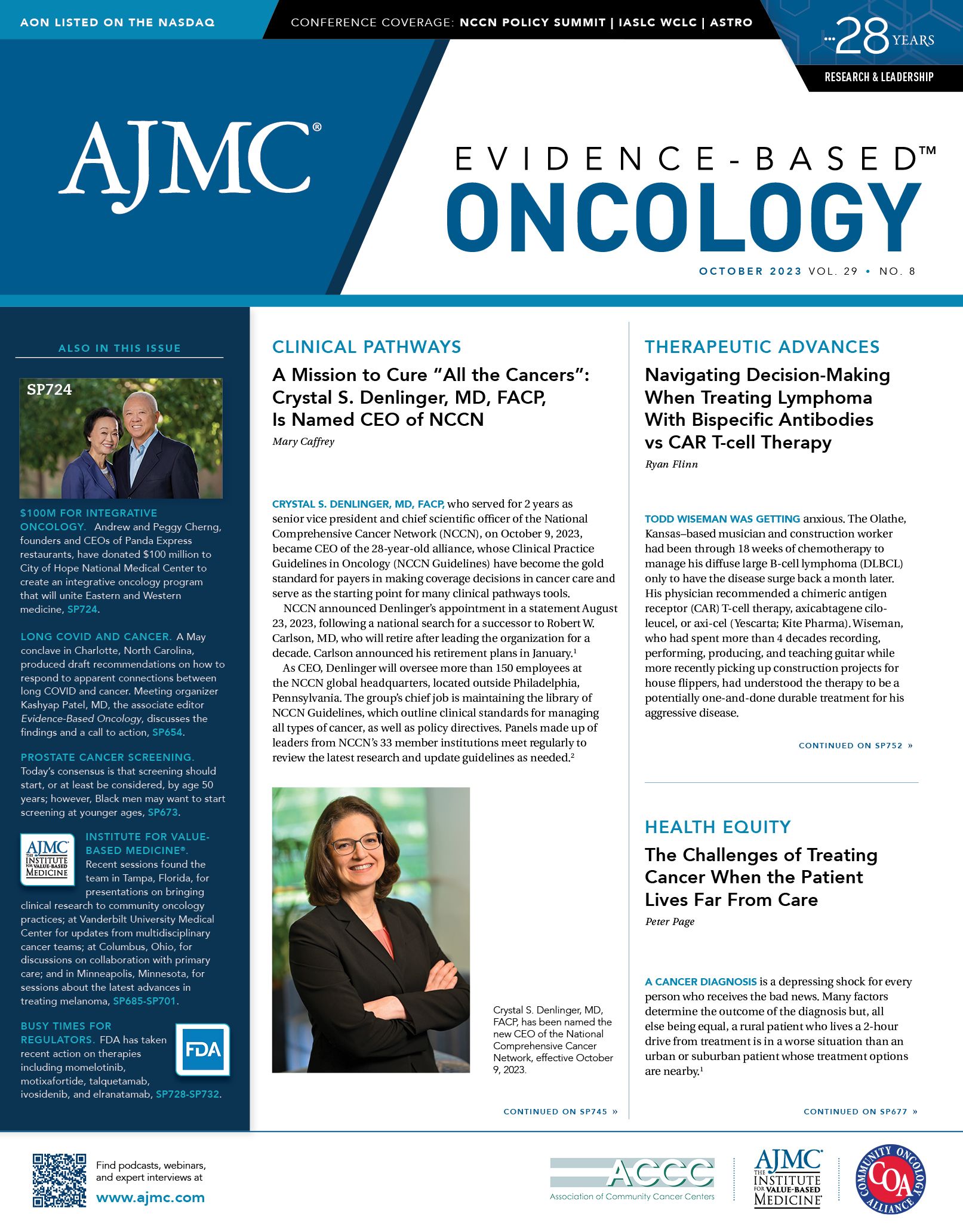- Center on Health Equity & Access
- Clinical
- Health Care Cost
- Health Care Delivery
- Insurance
- Policy
- Technology
- Value-Based Care
COA Supports Bills to Ensure Access to Cancer Medications
The endorsements follow the group's lawsuit earlier this year to overturn CMS' interpretation of the Stark Law.
The Community Oncology Alliance (COA) has publicly endorsed a pair of bills before the US Congress that seek to ensure seniors have access to critical medications, including those to treat cancer.
In a statement sent via email, COA announced support for bipartisan legislation to remove CMS’ interpretation of the Stark Law, implemented a generation ago to prevent self-referrals. Today, Medicare regulators are citing the Stark Law to block oncologists and urologists from mailing oral medications to patients who live far from the practice and from allowing caregivers to pick up drugs on patients’ behalf. COA has sued CMS over this interpretation, which was enforced with the end of the COVID-19 public health emergency on May 11, 2023.1
The Seniors’ Access to Critical Medications Act of 2023 (HR 5526) was introduced September 18, 2023, by US Reps Diana Harshbarger, R-Tennessee, and Debbie Wasserman Schultz, D-Florida, with cosponsors Chuck Fleischmann, R-Tennessee; Donald Davis, D-North Carolina; Mariannette Miller-Meeks, R-Iowa; and Troy Balderson, R-Ohio.
Community oncology and urology practices often rely on delivering oral cancer drugs through mail or courier to ensure care continuity, convenience, and affordability. These practices increased during the COVID-19 pandemic.
“CMS’ prohibition on medication delivery is an unconstitutional and dangerous display of government overreach that presents real and irreparable injury to patients,” COA said in the statement. “This is particularly true for those in rural communities or who face transportation difficulties.”
As COA explained in its statement, CMS in 2021 published a frequently asked questions (FAQ) document, which “interprets the mailing or couriering of oral drugs to be a violation of Stark law,” the federal prohibition on self-referral. A strict interpretation of the FAQ also prohibits family members or caregivers from simply picking up a patient’s medication.
The bipartisan legislation amends Section 1877 of the Social Security Act, clarifying as follows:
- Delivering medicines by mail, courier, or other methods and allowing a family member or caregiver to pick up medicines on behalf of a patient would not violate the Stark Law.
- These actions fall within the scope of commonly accepted Stark Law exceptions.
- In addition, the bill rescinds CMS’ previously issued FAQs on this matter.
COA also announced support for the Protecting Patient Access to Cancer and Complex Therapies Act (S 2764, HR 5391),2 which has been introduced in the wake of CMS’ announcement of the first batch of drugs subject to pricing negotiations between Medicare and drug manufacturers.
These talks are called for in the Inflation Reduction Act (IRA) of 2022, which states that the Medicare reimbursement rate for negotiated drugs will be based on the maximum fair price (MFP) negotiated by CMS plus 6%, rather than the standard average sales price plus 6%.
“Basing reimbursement on the MFP will drastically cut reimbursement for Part B drugs, hindering the ability of community oncology practices to administer drugs and keep their doors open,” COA said in its statement.2
The group cite an analysis by Avalere Health,3 which found that the IRA would trigger a minimum cut of 49.5% in Part B reimbursement for providers, which COA said is “unsustainable and irresponsible.”2 This comes after a decade of declining reimbursements, as outlined in a separate analysis that found a 5.4% real drop from 2014 to 2023,4 while medical inflation rose 28.4% over the same period, “creating an effective cut in reimbursement [of] 33.8%.”2
“Making this technical fix to how drug price negotiations are implemented in the IRA is crucial to the survival of our nation’s cancer care system,” the group said in its statement.2 “When practices close, it becomes harder for patients to access lifesaving medications, either having to travel farther to receive treatment or seeking it in the more expensive hospital setting.”
References
1. COA files lawsuit against HHS FAQ limiting cancer drug delivery to patients. News release. Community Oncology Alliance. July 28, 2023. Accessed September 20, 2023. https://bit.ly/3RvWsak
2. The Community Oncology Alliance supports the Protecting Patient Access to Cancer and Complex Therapies Act (S. 2764, HR. 5391). News release. Community Oncology Alliance. September 18, 2023. Accessed September 20, 2023. https://bit.ly/3PpqtWC
3. Analysis shows Inflation Reduction Act will lead to at least 49.% cut to cancer providers’ Part B add-on reimbursements. News release. Community Oncology Alliance. December 15, 2022. Accessed September 20, 2023. https://bit.ly/3LCWCst
4. Burnett B, Le C, Diskey R, Davidson M, Gutafson K, Sullivan M. Physician payment for some services lags behind inflation. Avalere Health. September 11, 2023. Accessed September 20, 2023. https://bit.ly/48AWtzV

